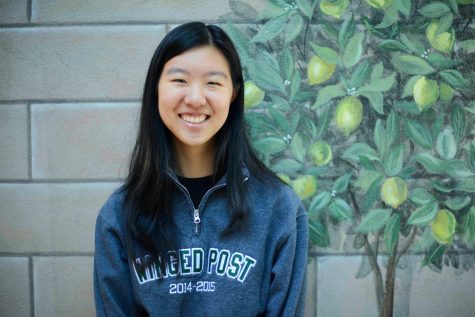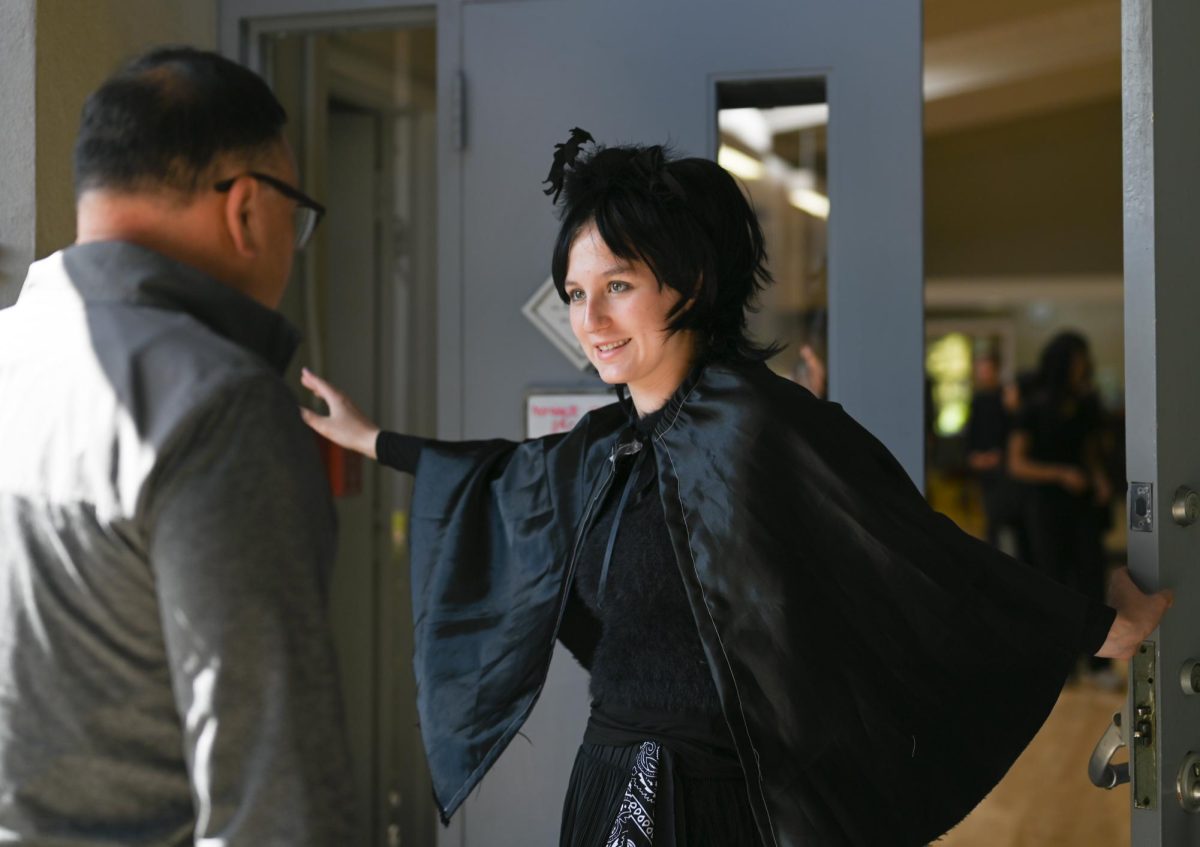Q&A with Dennis McNally, author, historian and Grateful Dead publicist
January 14, 2016
Sporting a tweed coat and a head of graying hair, Dennis McNally walks onstage, an almost textbook example of a baby boomer. He begins slowly, pausing every few seconds to find his next word. But after crafting the background of his story, McNally fully launches into his speech.
Jumping from Jack Kerouac to the Grateful Dead to the beat generation’s influence on counterculture, McNally immerses the audience in a historian’s world of the mid and late 20th century.
After his speech, Harker Aquila interviewed Mr. McNally about his decision to present at Harker and why he chose to become a writer.
Harker Aquila: Why did you choose to present at Harker? Your interest in counterculture seems to be the complete opposite of what Harker represents.
Dennis McNally: I’ll be honest, I knew very little about Harker. I made certain basic assumptions: it was a private school and therefore a place where students may benefit from hearing about these weird subcultures. Oddly enough, Grateful Dead flourished in prep schools. In the 60s and 70s it was the house music for all those really elite women in prep schools. So with that subculture there is a connection there. I have within the limits of my time and energy have attended the say yes invitation to the school. I just feel it’s an obligation, I have some information and I need to share it. When someone nice and calls, “We don’t have any money but come on down.” So that’s what I did.
HA: Who would you say are your favorite authors?
DM: Thoreau. He’s my favorite. That’s why I dedicated my last book to him. Thoreau, Suzuki Roshi, those are my favorites.
HA: How did you decide to become a writer?
DM: Okay, I’m going to tell you a story. And as I said, I’m a Buddhist and I’m going to use a Buddhist term and it was not all Buddhist experience yet I feel justified using the term. And I started researching the book in the 1970s where I put two years of reading letters at the library and reading books and interviewing people. And in the summer of 1974, I came here for the first time. I was living in Massachusetts to interview more people and do more library work and eventually drove home. And I was with my girlfriend and my sister. And my sister didn’t have a license and my girlfriend didn’t really like to drive; she drove three hours. And coming back we had no money. And no credit cards, no nothing. Just enough money to buy gas to get more. Which was fine, nobody was worried, if we crashed we would have called home and mom would have sent money. It wasn’t like anyone was scared about it. But it meant that I drove 18 hours a day, we drove for 18 hours, we slept for three hours and my girlfriend drove three hours. So I got really tired with the sound of the engine noise, the white noise of the wind hitting the windshield. And we were on interstate 40, Arkansas in the Ozarks. Full moon, brilliant, brilliant full moon at around three in the morning. And it was so brilliant and both of my passengers were still asleep, so brilliant the light that I turned off the headlights there were no other cars on the highway (I wasn’t suicidal) it was empty. And I turned off the lights. And I could pick up the paint and for 15 minutes I just drove. It wasn’t me catching, if you catch my drift. I was somewhere else, it was satori, a great spiritual moment. And the reason I know it happened, that I really know it happened, I got high on myself, is a month later in June I was asked to write an essay. For publication. And when I came back I wrote the essay. And it was published. And my professor from that publication said, “What did you do this summer?” And I went what… and he said the person who wrote the essay now is not the person who wrote this essay in the spring. And I knew he was right. That something had happened to me as a writer in that time. Well if you’re researching Jack Kerouac and you’re writing a lot and the road is having you rough it’s kind of appropriate that you have a spiritual thing while you’re driving. And I did. And that’s what, somewhere in there I developed a rhythm for writing to not make it too boring. And it’s got a rhythm. And it happened then. But it happened in a weird way that I knew that happened. So when I wrote the essay I thought “That’s not so bad! This is better!” So yeah, and that’s how it happened.
If you can get past the trivial, the brand of the car and the fact that there is an interstate highway system and if you can ignore that and look at what is going on in the book, the pursuit of freedom. In this country there is a diffusion of what freedom really is and there is one that is acceptable (freedom to make money) and there are other kinds that are more personal, more individual and certainly more important.


















![“[Building nerf blasters] became this outlet of creativity for me that hasn't been matched by anything else. The process [of] making a build complete to your desire is such a painstakingly difficult process, but I've had to learn from [the skills needed from] soldering to proper painting. There's so many different options for everything, if you think about it, it exists. The best part is [that] if it doesn't exist, you can build it yourself," Ishaan Parate said.](https://harkeraquila.com/wp-content/uploads/2022/08/DSC_8149-900x604.jpg)




![“When I came into high school, I was ready to be a follower. But DECA was a game changer for me. It helped me overcome my fear of public speaking, and it's played such a major role in who I've become today. To be able to successfully lead a chapter of 150 students, an officer team and be one of the upperclassmen I once really admired is something I'm [really] proud of,” Anvitha Tummala ('21) said.](https://harkeraquila.com/wp-content/uploads/2021/07/Screen-Shot-2021-07-25-at-9.50.05-AM-900x594.png)







![“I think getting up in the morning and having a sense of purpose [is exciting]. I think without a certain amount of drive, life is kind of obsolete and mundane, and I think having that every single day is what makes each day unique and kind of makes life exciting,” Neymika Jain (12) said.](https://harkeraquila.com/wp-content/uploads/2017/06/Screen-Shot-2017-06-03-at-4.54.16-PM.png)








![“My slogan is ‘slow feet, don’t eat, and I’m hungry.’ You need to run fast to get where you are–you aren't going to get those championships if you aren't fast,” Angel Cervantes (12) said. “I want to do well in school on my tests and in track and win championships for my team. I live by that, [and] I can do that anywhere: in the classroom or on the field.”](https://harkeraquila.com/wp-content/uploads/2018/06/DSC5146-900x601.jpg)
![“[Volleyball has] taught me how to fall correctly, and another thing it taught is that you don’t have to be the best at something to be good at it. If you just hit the ball in a smart way, then it still scores points and you’re good at it. You could be a background player and still make a much bigger impact on the team than you would think,” Anya Gert (’20) said.](https://harkeraquila.com/wp-content/uploads/2020/06/AnnaGert_JinTuan_HoHPhotoEdited-600x900.jpeg)

![“I'm not nearly there yet, but [my confidence has] definitely been getting better since I was pretty shy and timid coming into Harker my freshman year. I know that there's a lot of people that are really confident in what they do, and I really admire them. Everyone's so driven and that has really pushed me to kind of try to find my own place in high school and be more confident,” Alyssa Huang (’20) said.](https://harkeraquila.com/wp-content/uploads/2020/06/AlyssaHuang_EmilyChen_HoHPhoto-900x749.jpeg)










